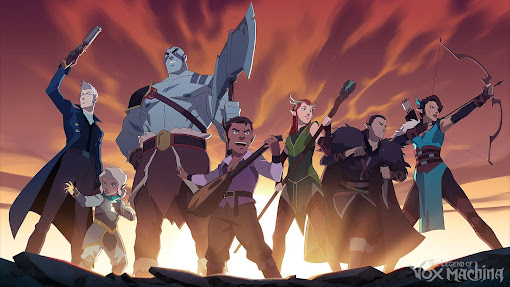When multibillion dollar movie studios create a movie, they measure its success through the number of ticket sales in theaters. Often, they hedge their bets on safe investments like popular book series which were in turn passed through the gate keeping process of the publishing industry and evaluated for profitability.
Adorno describes the movie and
radio industries as simply pretending to be art since mass culture acts as a
monopoly (Adorno 1) When the show production process plays out in reverse, with
fans fully funding a show prior to its creation, it complicates the line between
the cultural industry and authenticity.
https://www.kickstarter.com/projects/criticalrole/critical-role-the-legend-of-vox-machina-animated-s
With the newsworthy popularity of
their 2019 Kickstarter campaign, this was no doubt fuel for film studios to
push forward a cinema release of a 2023 Dungeons and Dragon movie. For
reference the previous DnD theater release was around twenty-three years ago. Hall describes cultural change as when a cultural form or practice is "actively pushed aside" for something else (Hall 6). DnD was initially a part of the culture that was pushed aside, but now it has experienced a revival.
With Critical Role going from having
a niche YouTube presence to having a show presented on Amazon Prime, Marcuse
might argue that it has lost its authenticity by joining “the established order”
through its “reproduction and display on a massive scale” (Marcuse, 1968)
Do you think that fan funded media
products can be regarded as “authentic” art? What if they sign an exclusive
contract with a streaming service that in turn makes fan backers pay an
additional fee to view the product they helped fund?


I love that you chose Critical Role and Dungeons and Dragons to write your blog. I am coming late to the Dungeons and Dragons phenomenon. My children love Dungeons and Dragons and have even made me and my husband join a campaign. For me, Dungeons and Dragons was a book series with rumors of a fantasy game, but I didn’t know anyone who played. This is very different from today, everyone plays, and the books are replaced with anime production like Critical Role. Regarding your question, I think fan-funded media products are more authentic than studio-pushed products. They provide what the audience wants, representing the people's genuine interest. I think Dungeons and Dragons is an excellent example of popular discrimination as it has changed as it has moved through the social structures of history.
ReplyDelete